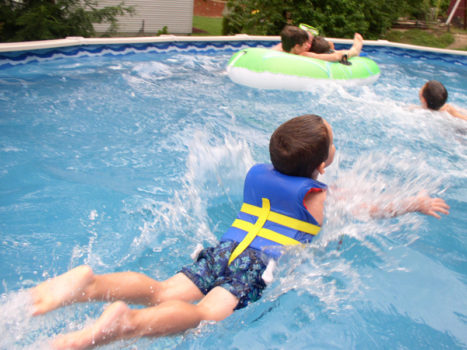Every summer we hear the devastating news that yet another child or young adult has drowned in a backyard pool. Most of these accidents are preventable with proper supervision, equipment and knowledge of life-saving techniques.
A backyard pool can provide countless hours of summer fun, but a pool also comes with big responsibility. As an owner of a backyard pool, it is your responsibility to keep your family and guests safe by providing proper fencing, supervision and taking necessary safety measures.
According to The Canadian Red Cross website (www.redcross.ca), “Most often, children who drown do so in a pool when a caregiver is not paying attention, if only for a second. These drownings primarily involve young children who gain access to a pool without a self-closing and self-latching gate.” Here are a few of the tips and steps on the Red Cross website which could help save lives:
- Build a fence that has a self-closing and self-latching gate; keep the gate closed with restricted access at all times. Refer to your municipal bylaws for fencing requirements.
- Establish pool rules. These can include swim with a buddy, children must have an adult with them at all times, and no glass containers around the pool.
- Few backyard pools are safe for diving – swimmers should always enter the water feet-first.
- Have readily accessible reaching or throwing assists, a working phone and first aid kit (taking Red Cross swimming lessons and courses in CPR and First Aid is also recommended).
- Small on-ground portable kiddie pools should be emptied when not in use. Above-ground pools should have the ladder or steps removed when not in use.
- Lifejackets or PFDs should be worn by weak or non-swimmers, but they are not substitutes for supervision by an adult with good swimming skills, or a lifeguard.
- Adult supervision is of the utmost importance – never leave your child unattended, even for a second. Take your child with you if you have to leave the pool for any reason.
Diving accidents are another cause of traumatic injury involving backyard pools. Many backyard pools are not designed for diving. Never dive into an above ground pool and always check the depth and length of any pool. Jump in to check the pool layout in terms of the variation of the bottom of the pool from the deeper end to the shallow end, as well as jut-outs along the pool sides.
The Red Cross recommends that “water depth be at least twice a child’s height before diving can be considered safe.” The website also states: “Neck and back injuries are a common result of diving accidents and can lead to permanent paralysis. These types of injuries are usually the result of diving into water less than five feet deep, and the accident is generally on the victim’s first dive.”
These and many other important safety tips can be found online at:
For more information on Red Cross swimming lessons, CPR and Aid Training courses, visit www.redcross.ca. By sharing this important information, we hope that all backyard pool owners have a safe, happy and healthy summer.
About Horowitz Injury Law
We have nearly 35 years of experience in personal injury law, serving Ontario and successfully dealing with personal injury cases including swimming and diving accidents. Pool and diving injuries often result in life-changing accidents such as spinal cord injuries including paralysis, catastrophic brain injuries, or even death by drowning. For survivors, the medical costs may be insurmountable. If you or a loved one has been seriously injured at a swimming pool due to negligence on the part of the homeowner or commercial pool owner, you may be eligible for compensation. Call us today at 416-925-4100 for a complimentary initial consultation to discuss your case. We will advise you as to whether your case has merit and seek appropriate damages to compensate you for your losses.




